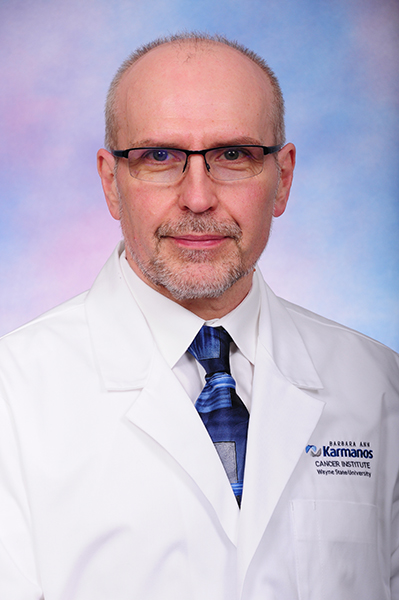Kay-Uwe Wagner, Ph.D., professor of Oncology at the Wayne State University School of Medicine and leader of the Tumor Biology and Microenvironment Research Program at the Barbara Ann Karmanos Cancer Institute, has been selected as the winner of the 2022 Drs. Anthony and Joyce Danielski Kales Endowed Faculty Award for Innovative Cancer Researcher.
Dr. Wagner received the award for his role as the principal investigator of a multi-institutional research team that identified the cellular origin of a specific triple-negative breast cancer subtype called claudin-low.
Dr. Wagner’s research, “Highly metastatic claudin-low mammary cancers can originate from luminal epithelial cells,” was published in Nature Communications in June. The article was among a collection of publications at Nature.com featured during Breast Cancer Awareness Month in October 2021.

Co-authors include Patrick Raedler, Ph.D.; Barbara Wehde, Ph.D.; Aleata Triplett; Hridaya Shrestha, Ph.D.; Jonathan Shepherd; Adam Pfefferle, Ph.D.; Hallgeir Rui, M.D., Ph.D.; Robert Cardiff; and Charles Perou, Ph.D.
“On behalf of all my colleagues who contributed to this work, I am very grateful for this honor,” Dr. Wagner said. “I see this honor as a recognition of the importance of basic cancer research that several of us scientists conduct here at Karmanos.”
During the last seven years, investigators from several institutions around the country have made important contributions in bioinformatics, histopathology and quantitative imaging to identifying the cellular causes of claudin-low mammary cancer. Dr. Wagner credited colleague Patrick Raedler, Ph.D., with leading the study and developing new genetic models for forms of triple-negative breast cancer. At the time of this research, Dr. Raedler was a graduate student at WSU and was Dr. Wagner’s mentee. He is now a postdoctoral fellow at the University of North Carolina at Chapel Hill.
“The newly developed models provide unique opportunities to investigate further the cellular origins of certain types of breast cancer and how they develop into highly aggressive malignancies. While the findings reported in the research paper are not immediately applicable to the clinic, they provide fundamental information about how cancer develops and how malignant cells can drastically change their appearance over time,” Dr. Wagner explained. “We also learned from our models that the malignant development is partially reversible, which heralds the possibility for certain strategies to detect and treat some of these aggressive tumor types.”
Dr. Wagner was honored for his research at a special seminar Sept. 16, part of the Karmanos Cancer Institute Seminar Series. He presented his research specific to the publication on the cellular determinants of claudin-low breast cancer. Additional publications highlighting Dr. Wagner’s research will be displayed at Elliman Clinical Research Building on the School of Medicine campus and the Hudson-Webber Cancer Research Center on the Karmanos campus.
The Kales Award in Oncology was created in 2012 at the WSU School of Medicine to recognize exemplary and innovative cancer research. Drs. Anthony and Joyce Danielski Kales established the award in memory of their brother and brother-in-law, Nicholas Kales, who died from lung cancer. The award is given to a WSU faculty member who is also a researcher at the Barbara Ann Karmanos Cancer Institute. Selection is based on a comprehensive review of published articles within the previous year.